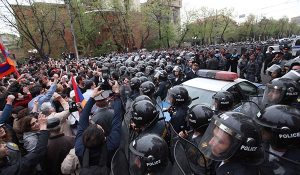The race is on for the office of President of Georgia after the governing Georgian Dream coalition led by Bidhzina Ivanishvili announced that it will nominate Deputy Prime Minister and Minister of Education, Giorgi Margvelashvili to the post. Given the massive victory that Georgian Dream registered in last October’s parliamentary elections and its continued popularity in recent opinion polls, Margvelashvili starts the race as the favourite to win.
The office of President of Georgia will be divested from most of its powers after the October elections following constitutional amendments that the previous government of Mikhail Saakashvili’s United National Movement (UNM) pushed through before its election defeat. Executive power will now be vested in the Prime Minister and his Cabinet. The UNM still has to nominate its candidate for the elections, and has announced that it will do primaries to select its candidate. A number of other Georgian personalities are considering contesting as independent candidates.
Georgians have traditionally looked for “a man on the white horse” to lead them. Georgian history is full of imagery of Georgian leaders, usually men, and on one or two occasions also women, riding into battle on horseback, often slaying a dragon. This time round the situation is rather confusing since the first person in the country will not be the one with the effective power. More…


 COMMENTARY:
COMMENTARY: Raffi Hovhannessian was the only mainstream Armenian opposition politician who at the end of last year decided to throw his hat into the election ring. He conducted a campaign that verged on the surreal – avoiding controversy, shaking hands, talking of serenity and unity. Some said that fools rush in where angels fear to tread; others accused him of legitimising with his candidature a flawed process; others dismissed him as irrelevant. He could have been any of these three things, or even all of them, but in any case it now does not matter. Whether the 539,691 Armenians who voted for him did so because they liked him or his programme, or because they were voting against the incumbent, we will never quite know. The issue now is not the election (if it ever was) but the political process, and Hovhanessian has emerged much stronger than any of the other opposition political leaders to play the leading role. After the election results were announced he was smart enough to understand that this was Raffi’s moment and he grabbed it with both hands, leaving both the government and the other opposition leaders confused and disorientated.
Raffi Hovhannessian was the only mainstream Armenian opposition politician who at the end of last year decided to throw his hat into the election ring. He conducted a campaign that verged on the surreal – avoiding controversy, shaking hands, talking of serenity and unity. Some said that fools rush in where angels fear to tread; others accused him of legitimising with his candidature a flawed process; others dismissed him as irrelevant. He could have been any of these three things, or even all of them, but in any case it now does not matter. Whether the 539,691 Armenians who voted for him did so because they liked him or his programme, or because they were voting against the incumbent, we will never quite know. The issue now is not the election (if it ever was) but the political process, and Hovhanessian has emerged much stronger than any of the other opposition political leaders to play the leading role. After the election results were announced he was smart enough to understand that this was Raffi’s moment and he grabbed it with both hands, leaving both the government and the other opposition leaders confused and disorientated. 
